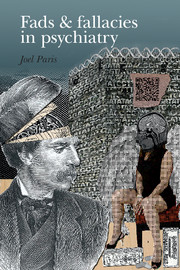5 - Diagnosis
from Part II - Effects
Published online by Cambridge University Press: 01 January 2018
Summary
Diagnosis is an essential part of medical practice. Since diagnosis often guides treatment, it is important to get it right. Classifying disease also helps physicians to communicate with each other. A category that is easily recognisable packs a great deal of useful information.
Ideally, diagnostic categories should be valid, that is describe illnesses that correspond to natural disease entities and that have a specific aetiology, a likely prognosis, and a predictable response to treatment (Robins ' Guze, 1970). Current diagnoses in psychiatry are too inexact to meet such criteria. The reason is that little is known about their aetiology and pathogenesis. In medicine, clinical observations can be confirmed using laboratory tests, genetic testing, imaging or biopsies. Psychiatry lacks any of these tools, and is not therefore in a position to define true diseases (Uher ' Rutter, 2012). The absence of a gold standard leaves diagnosis open to faddish ideas.
Classification systems
In the past, psychiatrists did not take diagnosis very seriously. Classifications were developed by the American Psychiatric Association: DSM-I (1952) and DSM-II (1968), and by the World Health Organization (ICD, 1993). But these systems were used for record-keeping, not for treatment-planning. In the 1960s, psychiatry came under attack for negligence about its diagnostic system. How could anyone consider the field scientific if practitioners could not agree on what was wrong with most of their patients? Reliability for even the most important diagnoses was low. It was also found that the same type of patient could be labelled ‘manic-depressive’ by British psychiatrists whereas Americans called them ‘schizophrenic’ (Cooper et al, 1972). It later turned out that a mistake of this kind could be even more serious than was thought at the time. The introduction of lithium, effective for bipolar disorder but not for schizophrenia, made differential diagnosis crucial. This was also an example, still unfortunately rare, in which specific responses to specific treatment methods contributed to the definition of a major mental disorder.
- Type
- Chapter
- Information
- Fads and Fallacies in Psychiatry , pp. 45 - 58Publisher: Royal College of PsychiatristsPrint publication year: 2013



